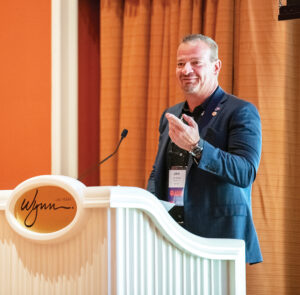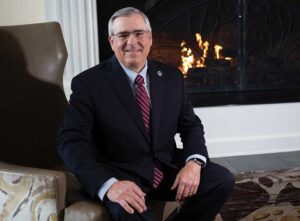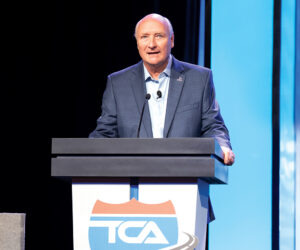Most of us have experienced the feeling: You climb aboard a 200-seat jetliner, buckle your seat belt, sit back, and wait for take-off. And wait. Finally, the plane leaves the terminal, waits in line on the tarmac, and moves into position on the runway. Eventually, the roar of the engines grows louder, the captain opens the throttle, and you speed down the runway before soaring into the air. New Truckload Carriers Association (TCA) Chairman John Elliott climbed aboard the association’s proverbial plane in March, took off, and has been flying high ever since. Read as he shares some of his experiences throughout the past few months, as well as what’s ahead, from a meeting at the White House, to meetings at TCA headquarters, to the association’s Safety & Security meeting, and next up, the annual officers’ planning meeting. He sat down with Truckload Authority to share his views on such issues as the lack of adequate trucking parking, the long-awaited Safe Driver Apprenticeship Pilot program, and the rising large truck fatality rate.
As we conduct this interview, you’ve just completed your first six weeks as chairman. Will you share with our readers what that experience meant to you and some of the things you’ve accomplished during that short time frame?
It’s amazing how fast time has flown already! I started off my tenure as chairman with a trip to the White House with Truckload Carrier Association (TCA) leadership and other industry leaders, such as the American Trucking Association (ATA). It’s an amazing feeling of pride to be in front of the White House as the chairman of the TCA, with ATA Chairman Harold Summerfield by my side, and realize what an important role we are playing to shape our industry in these times.

What is on your agenda for the next couple of months?
The next few months will be pretty busy. We just wrapped up our well-attended Safety & Security Meeting in Nashville in June, followed by the TCA Refrigerated Meeting in Traverse City, Michigan, July 27-29. I plan on being at TCA headquarters a few times to spend one-on-one time working with President Jim Ward and our amazing staff. We also have TCA Profitability Program (TPP) introductory visits in several cities, and our officer’s planning meeting, which will help shape the year ahead for TCA. It looks like I will be busier than ever — and that is just the summer months.
After a year of virtual meetings, TCA was able to offer an in-person, abbreviated convention in September 2021 before holding a full-scale annual convention in Las Vegas this March. The March event included format and content changes, and by all accounts was the largest and best convention in TCA history. Summarize for TCA members the highlights of the convention, and share some of the comments you’ve heard from attendees.
It was great to be in person and see so many industry leaders face-to-face. The networking and presentations were second to none, and by all accounts, some of the best content yet. We really took a good bit of time listening to member feedback from last year’s conference. The staff and planning committee worked hand in hand to change our format to improve the experience, and man, did it pay off! Committee meetings have never been that well-attended, with nearly all offering standing room only. But these are good problems to have as we learn and adjust. I think this has only prepared us to put on our best annual meeting ever in March 2023 in Orlando, so please block off March 4-7, 2023, on your calendars to join us.

TCA has sustained unprecedented membership growth over the past year. To what do you attribute this growth?
In my opinion, TCA’s membership growth centers on value and return on investment, hands down. The value TCA brings to its active and engaged members is simply a no-brainer. When you look at our efforts surrounding education, advocacy, safety, outreach, the TCA Scholarship Fund, philanthropy, and image, the membership decision is an easy one. Knowing that, more and more companies see it and want to be part of it.
The annual Fall Business Meetings and the Call on Washington will return this September after a two-year hiatus caused by the COVID-19 pandemic. Share with members, especially newer members, the importance of these two events.
I can’t overstate the importance of these events as they relate to the direction that TCA is heading. A few years back, TCA leadership wanted to bring about and develop a second “must-attend” event that focuses on the development of the association and the impact it has on the industry and government. The Fall Business Meetings, as a follow-up to our very successful convention, ensure that the committee process continues to grow and focus on the needs of the membership. Our Call on Washington places those very members in front of our elected officials to communicate the needs of our industry and indoctrinate them on our industry. If you haven’t yet taken advantage of this opportunity, I think you will find that this meeting is wholly worthwhile to attend and delivers the opportunity to move forward on truckload-specific initiatives.
Membership participation is important in any organization. What would you say to TCA members who are “straddling the fence” about becoming more active in the association?
You’re right — member participation is imperative to this association and it’s something that we continuously strive to improve upon, both in terms of every member’s value and our overall growth. We gauge our success through many channels. I’m happy to share that membership support and engagement have been very strong and at record levels in many categories. These include submissions for our Fleet Safety Awards, Highway Angel program, TCA Scholarship Fund, Best Fleets to Drive For, and Safety Professional of the Year Award. In order to best serve our members, we re-envisioned the format of our convention to convene committees in a stand-alone format, and participation has never been higher. We welcomed an incredible turnout of 1,500-plus attendees for our March convention in Vegas and over 300 for our Safety & Security Meeting in Nashville. These are both 10-year highs! In addition to these events, our educational webinars and their content have been well received, as demonstrated by the 400-attendee average in the past six months. TCA has also had great engagement with our biweekly e-newsletters, which have a 40% open rate from 15,000-plus readers. These successes, along with other member-driven initiatives, have led to a 94% membership renewal rate with our carriers. That’s a fantastic number and a true testament to TCA’s value proposition and high membership engagement.

There are many trucking-related issues that are getting attention in the industry today. Let’s look at some of them. First, the Federal Motor Carrier Safety Administration (FMCSA) has responded to several comments filed as part of the public comment period for the new Safe Driver Apprenticeship Pilot. Is TCA pleased with the FMCSA’s responses to these comments?
It is no secret that our industry is experiencing a shortage of professional truck drivers. If it is left unchecked, that number could grow exponentially to the tune of about 160,000 by 2028. That being said, we applaud the emphasis the Biden administration has placed upon this program and continue to look forward to what comes next. Our industry takes great pride in the development and training of safe, high-quality drivers that will help our nation move its freight. Now, all things being equal, we continue to wait on the pilot program, outlined by Congress in the infrastructure bill, that would allow younger drivers to operate in interstate commerce as part of that apprenticeship process. Once it is unveiled, we can proceed with exposing and attracting this particular demographic to our industry.
A survey of professional truck drivers by the Professional Driver Agency (PDA) shows the two most-mentioned concerns among drivers are equipment and pay. Do these issues match up with what TCA members are hearing from their drivers?
As an industry, I think the past two years have seen a tremendous growth in driver salaries. For a while, it seemed as if every week carriers were publicizing pay increases in industry magazines for drivers, which certainly pushes compensation forward as a carrier priority, in line with what has become a top issue for our professional driving force. However, according to the American Transportation Research Institute (ATRI), an issue that can be equally important is the availability of safe and secure truck parking so that our drivers can get the adequate rest while on the road that they deserve, with all the comforts of home available to them. Food, showers, safety, and security should be expectations that our nation and industry can meet, and these are necessities that we continue to voice on Capitol Hill. There is approximately one parking space for every 11 drivers who operate on our roads today, and 98% of drivers report that they regularly experience problems finding adequate parking, equating, on average, about 56 minutes of drive time looking for parking. If we had available parking that time could be spent advancing the load, thus putting drivers in a better position to earn more money and have better options for rest when the hours-of-service clock requires it.
The White House is releasing a new Permitting Action Plan to accelerate federal permitting and environmental reviews for projects related to the $1.2 trillion infrastructure Investment and Jobs Act. How important are these two factors in construction projects when it comes to completing road and bridge projects on time?
I think we are all aware of the bureaucratic red tape that exists when it comes to funding these large infrastructure projects through federal government dollars. They take time and cost more money, but I know we have shown that these projects can be less burdensome and still achieve the same standards we are used to in the development of new roads and bridges or adding onto exiting lanes. Eliminating the redundancies of these projects helps get these dollars spent in a timelier fashion at a time when improvements are so desperately needed.
Rep. Andy Levin (D-MI) has introduced legislation in the House aimed at allowing professional truck drivers to receive overtime pay. Under the current trucking business model, is it feasible for drivers to receive overtime pay? Does TCA have a position on this issue?
Generally speaking, TCA relies on our carrier members to develop compensation plans that are practical for their own operations, and current data is showing that driver wages are already rising at five times their historical average. Knowing that, the legislation in question doesn’t do anything that would actually help the supply chain. We need to focus on becoming more productive rather than justify the existence of retaining drivers. Plus, there is no evidence that drivers would actually benefit from the passage of the bill. Our industry is vast and made up of large and small carriers, including independent contractors that would not be affected by this bill if it became a reality. Giving drivers greater flexibility with their hours, incorporating greater access to parking, and improving upon communications with customers that will expedite the movement of cargo and equipment are the fixes we need to efficiently move our nation’s freight.

On a sad note, the National Highway Traffic Safety Administration (NHTSA) recently reported that nearly 43,000 people were killed on U.S. roads last year, the highest number in 16 years. In addition, wrecks involving at least one large truck were up 13%. This must be of concern to the trucking industry. Please share your thoughts.
This is a major concern for our industry, and those numbers represent very real people and families that have been affected by our industry operations and the performance of our drivers. I know the members of TCA strive for safety improvements on a daily basis, which is an actual foundation of our industry and one of the reasons our safety division has demonstrated greater success than ever before. In safety, there are no secrets, and carriers will always pass safety improvement ideas that they have had success with on to other carriers that inquire about them. That is one of the benefits of belonging to an association, whether it is a national organization such as TCA or a state association. Surrounding yourself with like-minded individuals breeds new ideas or answers to questions you may have about improving upon your performance. I speak for the industry in saying we regret every single accident that happens on the road today, and we actively search for technology and innovative ideas that will help prevent these accidents from taking place in the future.
On a personal note, are you thoroughly enjoying your term as TCA chairman? How has it impacted your professional and personal life?
I have always been a very hands-on, energetic type of person. This role has only added fuel to that fire. I love spending time talking to our membership and listening to feedback about what they most want from myself and TCA. I am very lucky to have an amazing slate of officers to work with. Those relationships have benefited me over the years in TCA, and beyond that in my corporate life and in my personal life. Surrounding yourself with great leaders and peers is of amazing value. I encourage every member to take that step. Attend the different meetings. Join a committee. Encourage your staff and leadership to be active and take part. The value it will bring to your organization and to your people will be more than you would have ever guessed.
Lyndon Finney’s publishing career spans over 55 years beginning with a reporter position with the Southwest Times Record in Fort Smith, Arkansas, in 1965. Since then he’s been a newspaper editor at the Southwest Times Record, served five years as assistant managing editor of the Arkansas Democrat-Gazette in Little Rock and from November 2004 through December 2019 served as editor of The Trucker. Between newspaper jobs he spent 14 years as director of communications at Baptist Health, Arkansas’ largest healthcare system. In addition to his publishing career he served for 46 years as organist at Little Rock’s largest Baptist church.








